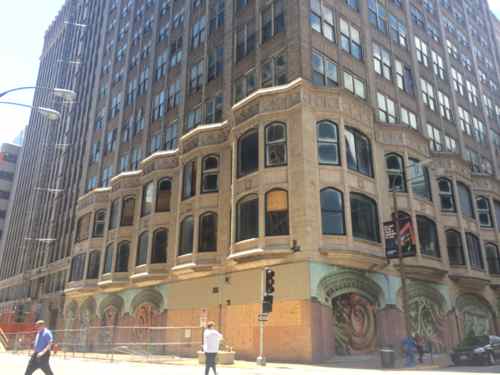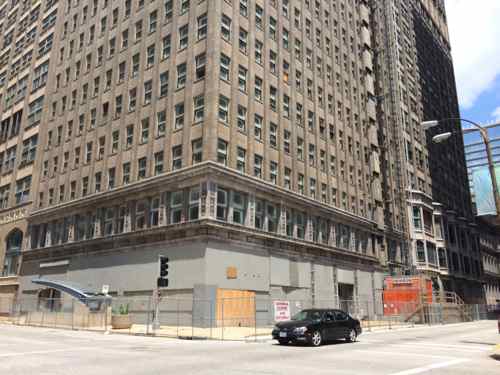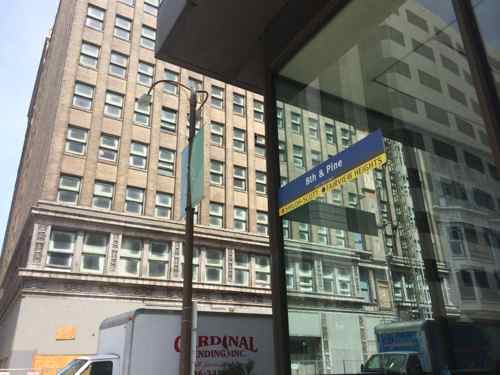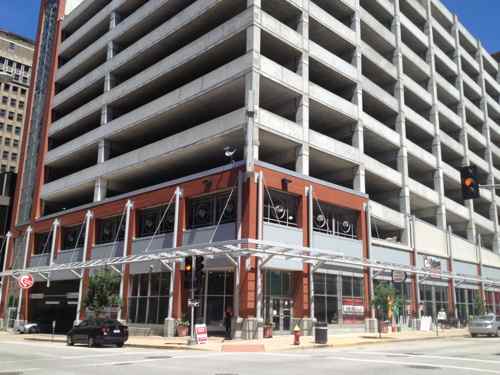Forget TOD, Apparently Parking Critical To Financing Redevelopment of Arcade-Wright Building
July 31st marks 21 years since the 8th & Pine MetroLink light rail station opened downtown, the Arcade-Wright building on that corner remains undeveloped. For nearly 20 minutes at the June Parking Commission meeting Otis Williams (SLDC: St. Louis Development Corporation) & Steve Stogel talked about a variety of downtown development issues, including why a lease for parking spaces in the 7th Street garage was critical.




During the 18 minute discussion many details about the proposed redevelopment are revealed.
The Arcade-Wright building:
- is owned by the LCRA (Land Clearance for Redevelopment Authority), for about 5 years
- is one of the last buildings awaiting redevelopment downtown.
- has roughly 500,000 square feet
- Webster University will lease the 1st floor, mezzanine & 2nd floor, 55,000 sq ft. Their campus will be about 90,000 sq ft total
- Upper floors will be a combination of (202) affordable and (80) market rate apartments
- $118 million dollar project
- LCRA bought the Arcade-Wright building for $4,500,000 after John Steffen’s Pyramid Constriction firm collapsed with 7-9 downtown buildings
- Mortage was held by Bank of America. Total for this mortgage and several other buildings was $32 million
- Interest had accrued and property taxes hadn’t been paid on the properties
- Development will let the LCRA get reimbursed for all expenses
- Not enough parking in the building, “the 200 affordable units have to park somewhere”, seeking long-term lease in the 7th street garage so the residents in the affordable units have parking
Other:
- Redevelopment of the Chemical building at 8th & Olive will move forward once the Arcade-Wright is underway
- The owner of the Laclede Gas Building is planning a renovation once Laclede Gas moves out
- Jefferson Arms is the other building that was held by Steffen in 2008 that hasn’t been renovated yet
- April 23, 2008 John Steffen asked Steve Stogel to help him liquidate. (Note: Pyramid shut down on April 18, 2008)
- The Chemical building is 160,000-180,000 sq ft
This was on June 12th, I’ve not seen any announcements since. I recorded (audio) of the nearly two hour meeting, you can listen to the last 18 minutes about the Arcade & development here.
Further reading:
- June 2013: Dominium to purchase Arcade Building for $9 million
- June 2014: Webster University to open downtown campus in Arcade Building
So all 202 affordable (subsidized) apartments at a MetroLink stop need a parking space in the garage a block away to finance the redevelopment. It’s unclear if parking at Dominium’s Leather Trades & Metropolitan is included in the base rent or an additional charge. I’m not sure anyone involved realizes the building is adjacent to an underground light rail station — one people would need to walk past to reach the parking garage! Enterprise CarShare also operates downtown, for times when residents need wheels.
— Steve Patterson
So I am guessing their is so groundbreaking date yet? So dose this project need a lot of parking. I am planning to move to this building after collage. For two reasons it will be affordable and it is above a metro-link station. Why do banks love parking so much? That is crazy.
Hope you’re not pursuing a degree in English . . . .
Not necessary.
Problem is that residents of affordable units are not paying for parking now, and most lily will not do so if this building starts to become full. I have been noticing that parking after 7 pm and on Sundays is becoming increasingly hard to find as it is now being taken up by my observation with people living in the Merchant Mart and other rental buildings. Regardless of what your feelings are about parking downtown, there is a certain cost to owning a car and we are starting to see indiscriminate development of high capacity buildings without adequate parking for all residents. The rational being that people renting at below market rates will not have a car or use pay for parking in a lot. But this is not how it works as these rentals seem to attract a large number of guests who are taking up the free parking on the street at night and on weekends, negating the idea that street parking will allow people to move through the area freely. I believe the only solution is to start charging 24/7 for meters like most cities. The modest parking cost will not deter people who are looking to spend money out, but may deter all of the freeloaders that the city attracts.
If parking is free after 7pm and on Sunday why should people pay to rent a space? I would go along with extending the hours of parking enforcement until say 9pm or 10pm Monday-Thursday and 11pm-midnight on Friday and Saturday. Increase the parking tickers too.
I don’t blame people for taking advantage of free parking. The problem as I see it is that subsidized housing does not take into all the considerations of the expenses required to live in a city. Like the ongoing issues with subsidized housing in New York , making rent affordable does not make a city affordable to those who can not afford to live their normally. A consequence of this is that the city sees more density with less people actually fronting the cost. If all of the parking spaces are being taken up by people who are staying with several others in the same fixed rate apartment, what happens to people who may wish to shop or dine within the city? I see the only solution as 24/7 parking meters, if you want to stay over night then put your car in a lot. Right now the city is on the front edge of seeing the concept of unlimited free or low cost parking being eliminated. In only a few short years I have seen our streets go with almost virtually empty to being full much of the time. It doesn’t take a lot of foresight to see this trend continuing as more developers take advantage of low income housing laws to build units and the city becomes more popular.
Subsidized or not isn’t the issue. The rental units at The Syndicate Trust don’t include parking, the tenants can lease spaces in the adjacent 9th street garage if they have a car.
Steve, your comments are similar to the ones you made yesterday – just because you don’t see much of a need to own a car does not mean that the rest of the world does! The people pursuing the redevelopment aren’t stupid – yes, they know there’s a Metrolink Station across the street – but they also know from direct experience what most tenants want when it comes to renting an apartment. And what’s being proposed – leasing existing spaces – is not nearly as “bad” as proposing to build a new parking structure or, God forbid, more surface parking. This is not anti TOD, this is a recognition of the current market for rental housing in downtown St. Louis. If leasing parking is what it takes to get this project financed, let’s get it leased – if not all of the spaces end up being needed after the project is completed, then the lease can be modified or terminated. But at this point, I see it as more important to get this project started, per whatever lender’s terms, instead of waiting another 5 or 10 years, just to prove a point!
I’m now a co-owner of a car and I’m very glad we have one space below our building for said car. If the developer offers spaces to tenants at additional charge then some will decide to 1) sell their car 2) not buy a car. However, if parking is included in the rent they won’t think about using transit instead.
Pot calling the kettle black? Your unit includes parking, yet you use transit frequently. What makes you think that everyone else is so stupid that “free” parking equals no need to use transit?! People who own vehicles “need” someplace to stash them, even if they only just use them once every week or two. The use of transit is predicated more on convenience – schedules that work and frequent, direct service – and the cost to park at the destination, than on whether parking at home is available. But if you want to look at government controls to encourage more transit use, make parking more difficult on the non-residential (work, school, sporting event) end of the trip – the real question here is how Webster will address parking.
After I sold my car I rented my parking space to a neighbor. Had I been renting a space I would’ve stopped doing so. The space is deeded to my unit.
And when you two decided to buy a car, you needed a place to park it. You could have continued to rent your space to your neighbor and pay to park further away, likely for less than what you were getting in rent every month, especially if it were a surface lot. But you, like most other people, chose convenience over a purely pragmatic monetary analysis.
Incorrect, when DJF moved in with me he parked his car on a neighboring lot. It wasn’t the most convenient but at the time the CPI lot was free and we liked the income from the renter. After 3-5 months the person renting our space moved, so he began using the space since he was now making enough we could afford to do without that income.
Money talks. “He was now making enough we could afford to do without that income.” How is that any different than including parking in someone’s rent? Or is your only issue is that you’re assuming that parking will be included in the affordable units’ rent? And that every tenant will occupy their space and not sublease it? As I read your chronicle, the only requirement is that X number of spaces be secured to obtain financing for the project; I don’t see anywhere how rents will be determined and what will be included or excluded – heat, cable, internet, parking, whatever.
My problem is the assumption that residential buildings need a space for every unit, In some locations you likely need two or more per unit but on top of a light rail station 0.8 spaces per every unit would be adequate.
Hopefully they’ll unbundle the parking from the rent, allowing the tenants to decide to lease a space or not. If the developer is now on the hook for leases of 202 spaces in a garage a block away I doubt they’ll suggest tenants use transit or Enterprise CarShare.
And who gets to define “adequate”?! Social engineers? The market? Politicians? Academics? Developers? Banks? 0.8 spaces per unit might work if they’re all efficiency / studio units. But if they’re (more likely) a mix of one and two bedroom units, the odds are high that there will be close to an average of 2 adult residents per unit, most of whom will have drivers licenses and many will own vehicles, even if they don’t use them every day! I’ll repeat, people need a place to stash their cars. If they’re a block away, they’ll be used less than if they’re downstairs, in an attached garage. You chose to buy your loft in a building with attached, covered, secure parking. Now that you have your reserved space, you think that the city should be telling other people they can’t have one?! Wishing cars away ain’t gonna make it reality, creating successful developments AND significantly improving public transit, especially outside of downtown, will!
Right now it looks like the developer will be on the hook for 202 spaces, so they might just say to tenants that one parking space is “free”, even though it isn’t.
It depends on how the agreement is structured. If the developer gets 202 spaces for $50/mo they’ll profit if the get $100/mo each. On the other hand, if this is just to appease lenders that sufficient parking is secured for tenants who want to rent a space or two then it is different.
I’ve met with Enterprise trying to get them to add CarShare vehicles west of Tucker, which they’re now considering. In 2006/7, as I was looking to move downtown, I considered the Arcade-Wright building sans parking.
One, every commercial deal is bottom line driven. If it takes agreeing to a $10,000 a month parking lease to secure $8-$10 million in financing, that, in turn, will generate at least $150,000 a month in gross revenues, you do the math – dedicating 7% of future revenue, now, to a marketable entity (like parking), versus not doing the deal, at all, is pretty much a “no brainer” – it’s just the cost of doing business!
Two, you may have “considered” the Arcade-Wright building, but you decided on a loft that included a
“free” parking space. I’m pretty sure that it was not THE deciding factor, but it was certainly one of many factors that you considered.
Three, no developer is going to “tell” their tenants not to use public transit or a car-sharing service, nor are they going to tell them that they have to use a parking spot (or the shared laundry room or the community pool). These are all amenities, marketing “gimmicks”, meant to differentiate a property from its competition – if the tenant actually uses them is secondary to getting them to sign a lease and move in.
And four, if the developer controls 202 parking spaces, yes, at least initially, they’re appeasing their lender. But, if things happen as we all hope, and downtown becomes more vibrant and parking costs escalate, then the developer will be sitting on a scarce resource, and will manage it accordingly (to maximize the return on their initial investment). The only real downside to this requirement (and this agreement) is if more parking comes on line (supply increases) or if fewer people want to park downtown (demand decreases), then the developer “will be on the hook for 202 spaces” that have less value than they currently have. And not no value, just less value – welcome to the wonderful world of business – there are no guarantees . . . .
When my co-owner and I bought my loft it was based on the reputation of the building, the very cool windows. Every for sale loft at the time included a garage parking space. My little 49cc scooter looked lost. My loft is more than a half mile to the closest MetroLink station.
Developers that do TOD projects do encourage tenants to consider modes besides driving, it becomes part of the marketing of the property. The Laural playa up its proximity to MetroLink as well as the availability of Enterprise CarShare. One couple I know that lives there don’t have a car, they walk or use transit, but get a car when they need one.
A few points worth making/researching:
1) I’m pretty sure this garage isn’t 24 hours. Or at least it wasn’t the time we got stuck in there. 🙂
2) How much does it cost to rent a space there right now? When I was working in the Laclede Gas Building, our carpool had a pass paid for by the company, so I really have no idea.
3) With that said, the top two floors never had more than a couple of cars on them…and with LG moving across Market to the GenAm and Macy’s all closed up, I can’t imagine there’s even as much demand now as there was then.
4) IF Arcade-Wright comes online (plus Chemical and a residentialized Laclede Gas Building), this structure could be primarily used by residents.
Ultimately, as J mentioned, it comes down to what works best for the management company. Do they pay the cost of a reserved space to make an apartment more desirable? Do they make it standard but increase rent? Do they let the individual renter decide whether to pay for one or not? And what’s the pricing difference between what the garage offers as standard and the management company offers as an amenity?
Bob and I hope to move to this building if we ever move from here. Parking has always been a downtown problem.